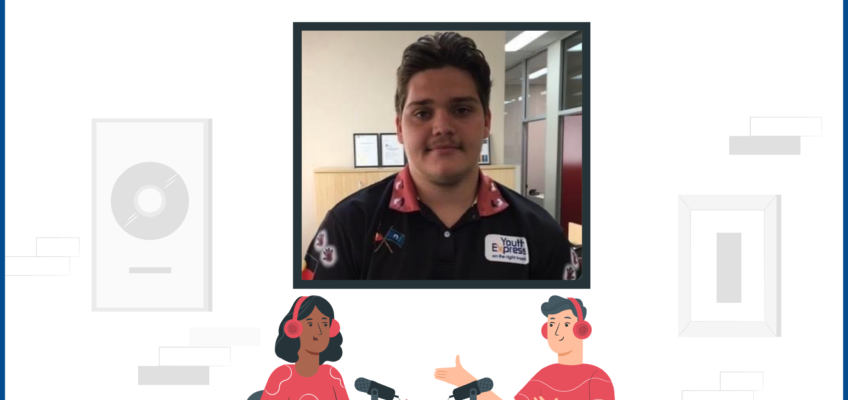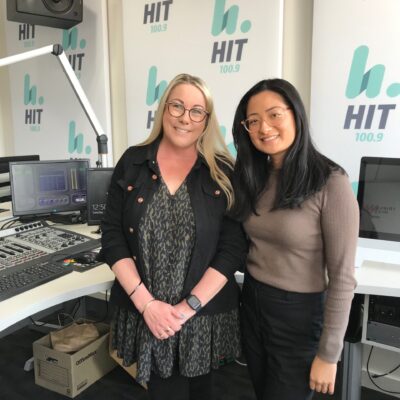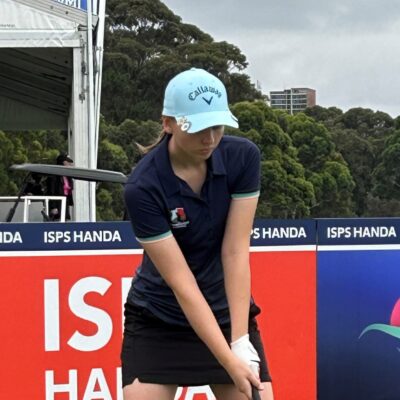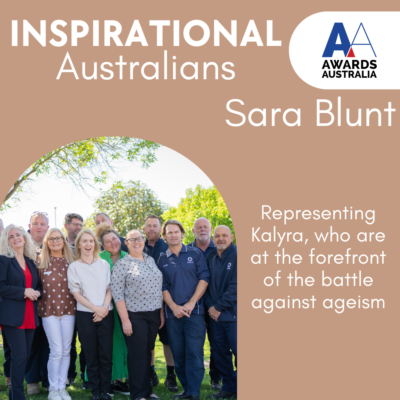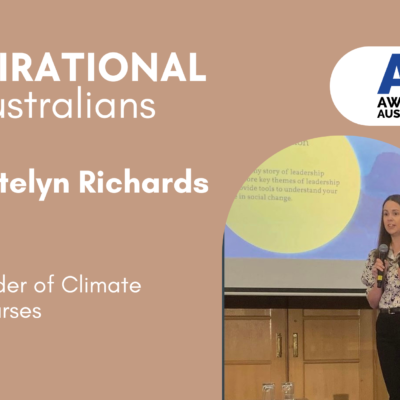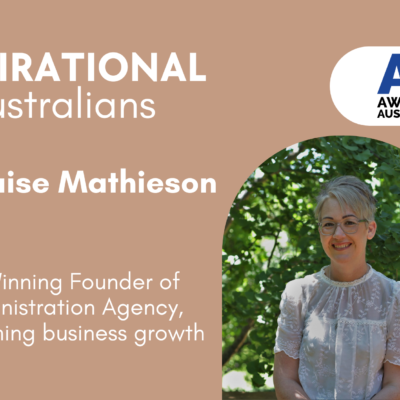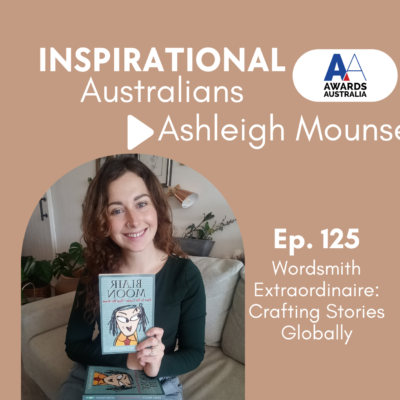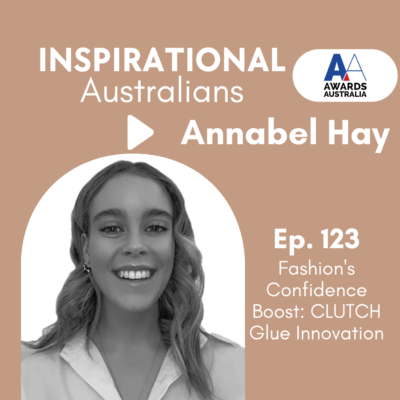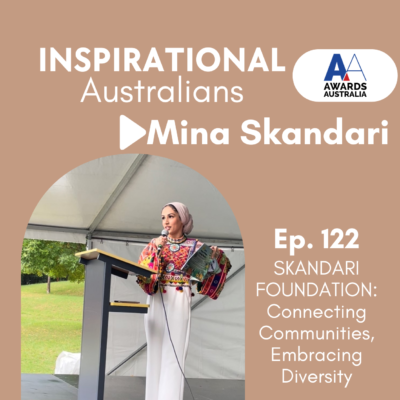In this week’s episode, Josh is talking to Sam Russell who was a Finalist in the 2021 7NEWS Young Achiever Awards – NSW/ACT
22 years old and currently work as a program facilitator for youth express. I work in schools across the hunter with the next generation and help connecting them to their culture. In my spare time I enjoy coaching sport
In this episode:
- Finds ways to connect to the kids before starting the program, from kicking the footy to watching TikTok videos. And talks about merging the two footprints – Aboriginal/Torres Strait Islanders and the Western footprint
- Sam Explains the intergeneration trauma in an informative way
- We hear about the Yarn S.M.A.R.T initiative – Strength, Mindset, Awareness, Resilience, Thoughtfulness
Links
Learn more about Youth Express at their website or Facebook or LinkedIn
Connect with Yarn S.M.A.R.T on Instagram
Find out more about the Kultja clothing range
Want to know how to Rate and Review a podcast, see this article
Follow us on our Inspirational.Australians Instagram Page
Want to nominate someone? (It can take as little as 2 minutes to recognise someone making a difference)
Like some more information on Corporate Partnership?
Transcript
[00:00:04] Josh
great things about, you know, working one school. Now with lots of schools. During the pandemic, Sam teamed up with dungog high School to run a suicide prevention day and raise money and awareness, which is really cool. And Sam, thanks for joining us here today.
[00:02:42] Sam
Thanks for having me. Happy to be here and hopefully inspire young people out there to take on their journey and follow their life through different steps and see where they end up as
[00:02:53] Josh
well. And how are you going today? First off?
[00:02:55] Sam
Yeah, pretty good today. Sort of getting back into it back in the swing of things this year so far. Yeah. Some good things coming up.
[00:03:02] Josh
I guess. You know, you working in high schools, your Yeah, your years really start to ramp up now that kids are back.
[00:03:10] Sam
Yeah, for sure. It gets a little bit busy anyhow. And we have a good, a good pass on, on the way out of the pandemic sort of things and a good vision there on the way that we can still connect with young people and in the safest way possible. So that’s exciting as well.
[00:03:22] Josh
So I want to ask you about Youth first, you know, just touch on the role before that dungog high School. Did you kind of grow up in that area as well?
[00:03:32] Sam
Yep. So I’m actually a pad delivery man and my family’s from a place called DUN laoghaire, South Wales. And I moved down here at a pretty young age. I went to school at Dunlop high School and graduated in twenty seventeen. So I finished school and like a lot of young people out there, I didn’t sort of finish and I was like, this is different now that’s my routine. I don’t have to go to school where I’m going to do my life sort of thing. So it’s pretty lucky and the school actually reached out to me in my first year at a school, I ran a bit of a relief position up there with the Aboriginal students in our education officer role. So I took it thanks to their guidance, which was something that I’m always striving for because it’s pretty much where I am today, which is good in a school where I knew I was only there last year as a student and has had its challenges as well but they were pretty supportive and, and it was sort of good to go back to somewhere that has given me so much and give back as well. So I did that for probably or maybe like ten months. Yeah. During that time, there was a program that we, that was running the school by Express which was the culture song program where I met two fellows and they used to come and deliver the program. And we formed a pretty good relationship through that program and, and yachting and stuff with those two fathers. And when we finished up that year in twenty eighteen, they actually said that it was an opportunity to apply Youth expressed for a role which I did. And that was as a program facilitator, so that was only actually two days a week. And then they gave me three days, but then I had to fill my week in. So I applied at Mount high School, which is at an area for aboriginals also, which I was unsuccessful in that role. And I did two days a week there. So I did that for two years. And ever since last year of being full time, the ECB stressed so a little bit of a journey but experienced a lot of different things, I think at a pretty young age, which sort of made me, I guess, drive a little bit further and different environment as well, it’s crazy how the schools can only be like forty five minutes away from each other, but have a completely different culture and different views and different attitudes as well. So good experience and yeah, very thankful for the way that
[00:05:43] Josh
yeah, that is quite a cool appearance and sounds like you were straight onto her after high School just straight into working. So what’s, what’s kind of the difference between working in one school focusing on those students? Two, then Express think you mentioned you cover over twenty different schools.
[00:06:03] Sam
Yeah. Yeah. So I guess you get one of the main important things to me is when I instantly establish a relationship with the kids that we work with, First and foremost. So, you know, I really connect with them and genuinely care about these kids. Some of the kids that you do meet, they might seem like you’re the only person that actually cares about. Some of the stuff I might have happening can be pretty serious. So just by showing that half an hour to an hour of kindness and invested into this sort of life, it can make a massive difference to them. So I think working in the school and sort of, you get to establish that relationship even deeper. And you say at least two times a week, so you can really work on that and then have a look at what’s happening and then have that support network with them. Twenty four seven. And then I guess the other side with the Youth expressing you just experience different walks of life and different people. Sometimes they can have a challenge just to go from a school to a high School. So they hold different challenges on level personalities. And obviously some of the stuff that you say in school, you wouldn’t talk to high school kids like that and vice versa. So I do love going to the different schools because like I said, you can sort of inspire if I can inspire one person a week, then you know, I’m sort of happy in that and like some kids really end up and they want to learn more and with that program, one of the main importance is for us is that we really don’t want to go in there and preach. We basically want to go in and share some of the experiences we’ve had and some of the knowledge that we have and then guide those kids on a journey. They need to fill in that from childhood and then will come off as well, which is important. So yeah it’s, it’s good, it’s fun. Youth Express is supportive in everything they do and have created a great foundation, which I have other programs as well. But yeah, I think the foundation created in their reputation for me makes it a lot easier for us.
[00:07:53] Josh
My next question is kind of got two parts is wanting to know Firstly being quite young yourself and I guess not that far removed from the older high School kids. Firstly, does that help you to connect with them because, you know, you’re not seen as like this old guy coming in and as you said, place to him. And secondly, the second part of the question is, does that put any pressure on you? Sometimes feeling younger? I guess than, than some of your peers. Mm hmm.
[00:08:18] Sam
Yep. So it definitely does help in, in certain situations. Like I said, I want to establish that relationship. So with our programs, we do a lot of traditional games like I don’t really. It doesn’t faze me. So what do you have for the first twenty minutes? ? When are they going to engage and they want to learn and they’re going to listen to me properly for the rest of the program sort of thing. So it does help being sort of up to date with some of the trends and some of the things that are going on these days. You know, there’s some little tiktoks in there. The dances and different music and stuff helps relate to them a little bit more and like you said, I’m pretty young myself. So I wasn’t, it wasn’t that long ago when I was in that position and I understand, you know, some of the things that might be going through. But I guess it is, it can be at times, had its downfalls as well. There has been some times where some kids might see that I’m a little bit young and try and maybe you know, take advantage of our program a little bit in terms of that. But the thing that is so good about, I guess, Express expressing the different places of work is they have really good ways where you basically learn on the job, I guess. So you might have one bad experience and, and you’re not going to make that mistake again. But then the downfall is you sort of that can sort of live with you for a little bit. I remember it being when I was like nineteen or twenty something would happen with a kid. And then you know, I would always beat myself up. What am I even meant for this might even be of this, but you just have to let that stuff go. You know, you can’t help everyone and, and some of our kids will learn the hard way, which is hard to watch and hard to see. But you can provide that support there and that’s all you can really do. So it does have its downfalls, I guess in terms of sometimes you might not have that sort of, I guess rapport with the kids because you are a little bit younger. But generally speaking, it goes pretty well because they kind of connect with me a little bit and I think pretty well in Majority of our schools, they are well behaved kids and if you give them that opportunity and given that that time and generally care for them you’re going to get the best out of them.
[00:10:16] Josh
Now you were a new South Wales guy, so you know, you said throw the footy before and I’m thinking we kick the footy and then I realised, I mean, Victoria, you probably talking about later rugby, what are you talking about?
[00:10:30] Sam
Yeah, yeah, I’m definitely, definitely league. I grew up playing rugby league pretty much, most of my life and then played a bit of soccer as well and have coached a soccer team in dungog for the last three years, which is pretty good. So that kind of keeps me busy on the weekends and we actually with my, when my work is at its best, mostly we’re actually coaching on the fifteens ladies tackle team this year. So That’ll be interesting and also challenge, but yeah, definitely league I haven’t, I haven’t played much or watch much of the AFL game you can get that then down South on your side. But yeah, that’s great. Yeah, well you know,
[00:11:09] Josh
I’ve always found sport to be a good connector, especially for males. Male kids, you know, you don’t know to talk to about then you can usually find something in common just by throwing a ball or kicking a ball or whatever it is. So that’s cool to hear that you’ve built that into your kind of mentoring as well. So did you get aware of Youth Express yourself as a high school student or as a school student yourself?
[00:11:34] Sam
So they have the different programs, like I said at U.S. expense, they have a work placement program where basically their role is to connect with our high schools in the area and get their year eleven and twelve kids centered on that subject. So obviously construction works and the metals and primary industries, hospitality and get them application because you obviously need so many hours of work placement to complete your agency. So I was first during the construction year eleven and twelve and, and they sort of set me up like that, but I never knew what they basically offered to the community or what they did. Because the other programs I have there is like a tag which is economy and to transition to work basically. So when they but it’s I wasn’t actually on it as well. So can be pretty much any ages and it’s pretty much mentoring and support to get into something or work with that program that we do in schools. We often identify some kids that, that might be looking, get them, get them some support to journey into the next stage of their life. Because as we know, a lot of our kids, there’s a bit of a gap there from school to where they go into. And unfortunately there’s some of those bad things that can influence those peoples lives after they leave school and take that bad road. So we can step them up into some sort of support and mentoring program. So transition to where we’re training them, then that’s good. Then do some different little programs in office as well, which is with I guess level classes disadvantaged young young people. But yeah, I wasn’t really aware of them, I guess it wasn’t until I started to come up and run the program it and my work and I was like, oh I know a lot of this stuff and this looks pretty good. I love this. And then we got to of talking most weekends and, and most afternoons and it was
[00:13:15] Josh
the same. Can you tell us about the other program, the coach a strong program as well?
[00:13:20] Sam
Yep. So our program at Youth Express is ISO, it’s Indigenous advancement strategy. And then we basically create our own programs under that sort of under that banner a little bit. So our main program is culture strong and I guess that’s more aimed at promise also, I guess any sort of kind of schools and then is seven to nine. And obviously that’s a pretty big, drastic change. So it’s going to be able to be in depth as you get into high School. But it is important that we do focus on our promise school kids too, because if they don’t have that sense of pride for their culture, they’re going to transition into high School. And then sort of a little bit of shame and they don’t want to put their hand up and they don’t want to be leaving class to do some cultural things for their kids. Like, why are you leaving class? And we want to break that a little bit when I was going to do that at Pomona when they were five and six and before and when they get to high School. And they know a lot of the, a lot of the stuff anyway and the culture enough to sort of form their own journey from there. So I guess the main elements around that is to footprints is the first bit which is basically their, their cultural footprint or the Aboriginal and Torres Strait Islander culture. And then the Western society footprint and how it’s important to basically learn about both those and you can’t, you can’t help along the new journey have to, in, by footprints. You know, it’s hard to get by with just one of those. It’s important that we know both, that’s the first element of it and then there’s the traditional games sort of thing. So obviously learning nutrition, games, learning the backgrounds of them where they come from and then action plan from games. And in the past we’ve had some different transition days with the primary schools and high schools, we all get together. We might teach the high school kids these games. And then we basically do like a massively transition day where they teach the younger kids, the games and it’s around, you know, the transition to high School and that’s been successful in the past. And then we have have our role models sort of element where we look at look at role models and, you know, identify who these are, all those people, you know, obviously you feynman’s general questions are emails, most of the people, but can also be an uncle or a friend or even your mom or your dad, which is what we sort of want to tap into a little bit as well. And then the first one, the first one that we actually run in our schools for the first time is around identity. So looking at Okay, you know, the average, you know what we found out, but what does that actually mean to identify as that? So can we have a look at maybe what your family’s from do we know what your terms are? ? Do we know any of your history and it’s funny, they don’t very lucky. We have to understand that there has been some dramatic events that’s happening in our history that has, you know, cause that disconnection, but to try and revitalize that and sort of do that journey for him. So it’s about finding out what you do know and, and being proud about that. Yeah,
[00:16:07] Josh
that’s really interesting, Sam. You know, so many things to touch on from what you’ve just said. But one thing was if a kid kind of says, oh look, I don’t know some of the details like, how do I find out? Yeah,
[00:16:18] Sam
yeah.
[00:16:18] Josh
. So you give,
[00:16:20] Sam
they can be tough to, to basically find out. Especially with a lot of our kids when they come to hunting and stuff. But I guess if they have a general knowledge of, you know, maybe where their grandparents grew up or, Oh, do our family tree. And then we’ll get them to highlight the people they know in their family that do identify as Aboriginal. And a lot of them are still alive that do identify so often say, well let’s ask some questions. You know, like I wasn’t used to all that. And so that narrative question about culture and come back and tell me next week I don’t care if it’s like, you know, where did you grow up or what do you know about our culture or what do you know about our family life that informs us? ? These questions before they do passed away because when they do pass away, it’s a lot harder to find that expression. Yeah. Otherwise, you know, we can, if they’re really keen to, and they really want to find out some stuff and they know general areas, you know, maybe where their family comes from and stuff. We do have some pretty good connections in community too. So we might reach out to someone and see if they know anything about family, not home or anything like that, but again, we want them to form their own paths and make their own connections in doing that as well. So
[00:17:28] Josh
yeah, so it seems like it’s very, almost like verbal, you know, the stories being passed down from the knowledge being passed down from,
[00:17:37] Sam
from the old. Yeah. Basically. And when you think about it, our culture is, you know, sixty thousand plus years older. And the way it’s evolved that long is by passing down stories and experience from elders and Learning. So there’s no reason why we have to change something that’s worked for so long. And we have to continue to do that to make sure it stays alive. And then it’s getting better and I guess that’s what we’re going from every day. You know, trying to want to make sure that our kids can do that connection and build that sort of pride. I guess it’s, it’s hard as well because there’s a lot of a lot of young folks that, you know, they might be darker skinned and they might not know about the culture or they might even be learned doesn’t matter. But they don’t know about the culture. They gonna have that, you know, loss of identity, it’s awkward, I fit into this community, I don’t fit into that community like where do I belong and stuff so, and it can be something that leads to, you know, further some of the issues to these young people as you know, and the statue and stuff, but we can try and stop that and build that sense of pride. And yeah, that’s important as well. But again, I don’t want to engage in that way. I’m not going to force them to later and we get a lot of kids that are like, not got paid today or I got this today. I’m going to class. It’s like that’s fine. But we also have a mission, you know, every second week or two weeks in a row, because this group’s going to advance into the next element. And you’re going to be behind a little bit. I mean, we want to build up our games as well. So, you know, we want our kids to be able to know that what we talk about and the things that we do after them. Majority that stuff is going to stay there. Obviously, some of the stuff is fine because we do want them conversations to start. We want that to happen inside or outside of the parents where we at this we did that. So yeah, that’s important. I think generally speaking it’s, it’s pretty good.
[00:19:19] Josh
So you touch on the parents just now and again, previously is that seemed to be a bit of a common generational thing where, you know, the grandparents perhaps are a bit more closely connected to their cultural knowledge. And then there was something missing in that next generation. And now today’s kids are trying to
[00:19:37] Sam
think, so I think so as to why. Yeah, I think that might be the most honest question. I’m not too sure why. There’s a lot of things that can, that can lead to it. Obviously when you think about, you know, the things that have happened next generation, people seem to think that they were hundreds of years ago. You know, like, it wasn’t that long ago. Yeah. A lot of these grandparents and stuff that probably grew up through that period. So when they got punished for something and they got punished or you know, talk about their culture and talk about their language and stuff. I guess there’s obviously some, some trauma in that too. So after that happened and those events had to happen, they’re not going to talk as much either. So there has been some, some young young kids where they just didn’t find anything out or they didn’t know anything because their grandparents wouldn’t say much either. Because obviously some of the age and management of what happened. So we actually call that intergenerational trauma and I guess that leads to where our young kids grow up, disconnected to their culture because of the things that have happened to their grandparents that have led to that, that closed sharing of information where they don’t, doesn’t want to share it, they’re too scared or they’ve just walked away and then we can’t learn about it. So that’s sad, but it is. Yeah,
[00:20:50] Josh
yeah. Well you’ve explained that same is, is really, I think informative. Yeah, because that, Yeah, I think as you said, some people maybe gloss over that, but the way you’ve explained it to me really paints a picture of, of why what you’re doing is so important.
[00:21:06] Sam
Yeah. Yeah, I guess so. But at the end of the day, it’s their journeys too. So I wasn’t interested in it in that passion in it. And that’s good. That for myself, I’ve done a lot of work in informants. I guess my journey in connecting to my ancestors and people in the past and finding out where we sort of come from and what happened there, which is, I think, been pretty good. Learn a lot of stuff and then get to that end. And in that, it’s something that you will do forever. So yeah,
[00:21:38] Josh
that’s a great point you raised do you find that as part of this process that you’re, you know, it seems like you are that you’re learning and you’re actually developing kind of a sense?
[00:21:47] Sam
Yeah, we, we learn all the time. We learn about ourselves as much as the kids learn and that lends itself, we try to Excel with. It has been a lot of the times where you do get to get some kids and have grown up pretty connected to their culture. And then they share some things from their culture. And you learn again and, and you know, the main thing we stand for is we don’t want to change culture and me and my boss. So we don’t come from this area as well. So we’re not going to be like, you know, this is what these people do. This is what you should do sort of thing and keep it all generalized. And then, you know, hopefully give them that passion like we have to, to go and chase that journey. Some will just use it to get out of class unfortunately, and some might not follow it up, but at least I still have that bit of general knowledge around that sort of stuff. So even in the situation, I want to follow that up. Then I can make them sort of, they know where to go to. They know where to source of information or to start that journey, which can happen in all different times. I think.
[00:22:47] Josh
So true and you know, might be down the track is down the track and all it takes is that, that little memory of that time in the program with you and they’re like, oh yeah, I remember that actually that kind of yes, yeah, that’s a cool thing. I would so you also mentioned about the role models and how you’ve got your celebrity level role models and iconic role models that as closer to home. I want to ask you about the Johnson initiative that you started with Youth Express. Tell us about that.
[00:23:16] Sam
Yeah, so I guess the mental health stuff, particularly suicide has been something that has impacted my life a little bit. It was only a few years ago when we lost a classmate of mine to that and living in a community that I do. You can sort of see how it affects everybody in a lot of different ways. So I guess that’s something that I always try and do you know for ever now more so much now that I know the impact of it in the way it can affect people. So I guess with the young stuff that’s about, you know, really trying to break that break that stigma around mental health. You know, not just because they’re tough, pretty bad doesn’t mean they don’t go through these things or just because he’s a blow, it doesn’t mean that it doesn’t sit in a quiet place and have a problem. And then, and normalize that stuff like you can feel upset. And so often when few mates might get together, they have a few movies and stuff. And then they start getting really dazed and crying and getting upset. And it’s like, you know, they shouldn’t take this stuff too to be able to talk, which I know it can be hard, a lot of the time and you just, I think we can. But I guess the on smart stuff is about children. To normalize that a little bit and smart actually stands for strength and strength. And once it awareness, resilience and thoughtfulness. So obviously those things are all pretty key in ensuring that your mental health is as strong as it can be. Sometimes, you know, when you’re going through the hardest chapter of your life, and that’s only just because you’re learning new ways to, to put things aside and deal with them at the time will do them when it’s sort of a little bit better. But I guess in terms of the initiative that we created, we pretty much did it during lockdown. We couldn’t do much less tools. And it was just a way to be like, you know, you think about these things with our kids that they use as outlets fully suck on that or whatever. They do a sport that’s been taken away. Some of the homeless might not be known to be that great, so now they’re at home with that twenty four seven. When they might have had schools in that let you know they’re with their brothers and sisters that more and more of the time. Twenty four, seven now because we’re locked in and they’re also doing things like using a mobile phone gaming, all that sort of stuff at a higher rate because they’re also at home so, and that can affect their mental health as well. So again, assuming lockdown, or lack of, we can put these pushes out there a little bit. If you know it changes one person and makes one person’s phone and then we’re happy. So we have some different people that we’ve already interviewed. And obviously continuing to do that just around some of the things I used to, I guess overcome some of the bad days as we know we can wake up one morning and feel like, yep, let’s move mountains and then the next day it’s, I don’t want to get too wet, so yeah, I guess around those different escapes they might use and then different people that have come through that adversity as well. And so we made a mental health awareness process as well through a company in Newcastle called vra. And they got the QR code in the middle of the posting and get it through augmented reality, where you scan the code and it gives us a bit of a preview of each person. So we’ve got those flyers and I guess as we go through that element of our culture strong program that has that. And then we can, we can have this other support base where they can be like, you can follow on Instagram if you want. And then they might see some things on their, in their own space that might be able to sort of inspire them or you know, whether it’s to reach out to get help or talk to a friend or even just to make it has to be brought up
[00:26:42] Josh
that’s right, and that’s John smart for Instagram and upload it. And if you can’t find it for typing enhancement, and it’s got like the dots, the periods in between. Yeah. And who are some of the people that you interviewed on that?
[00:26:56] Sam
So we obviously interviewed latisha and she actually was a part of the young achiever award as well. So that was pretty exciting to do. And then she and that, Well, he played footy for Melbourne storm. Yep. Jack Wilson, he was a Disney Ninja warrior Cameron Manning who is a proud Aboriginal that was from this area and is now in various ways we interviewed Neville is as well. Who like I said, used to work at Youth Express, and Williams has now sort of moved on to his own things. He’s got to name it, but he’s also got his own clothing business. So I’ll give that a bit of a plug as well. It’s called the culture. It’s pretty good. It’s just sort of taken off now, which is awesome as well. And I know he has that passion, that you know, it’s more than just clothes. It’s about inspiring people as well. And telling his journey, amongst exciting designs too.
[00:27:47] Josh
Cool, you didn’t say latisha there. So for those who are maybe listening and not realising that is Latisha and Sam about homeless to get that in the transcript. Indigenous achievement award category. As I mentioned, the top of the podcast that it’s part of the seven years young achiever was often used when I was in a.c.t.. And yes, honestly what a latisha ended up being named as the winner. So that’s really cool that you guys have kind of collaborated and connected down the track.
[00:28:14] Sam
So yeah, I didn’t even know who she was until the awards night. And then we actually spoke on that night and she, she said that she was person which isn’t far from our work. So yeah, we kind of have been talking a little bit over lot of stuff and then go to and interview Tasmania, but she was good for that as well. Good for our young young girls and you know they can have someone to inspire to as well. And then we have, I mean it’s an exciting, she’s got a bit of an exciting program in the Maitland area, basher entrepreneurs, that we’re going to sort of work in and sort of help with there in the way we can. But we had a meeting last week and I know she’s pretty, she’s pretty keen to get it up and running. So something to, to sort of look forward to coming up.
[00:29:00] Josh
That’s awesome. We’ll have to speak to her on the podcast as well. Yeah. That’d be great. So yeah, we love seeing those kind of collaborations and relationships form as you said, you didn’t know who she was and then you’ve kind of been brought together through these awards program. And so that stuff we love to see what was it like other than getting to meet leticia at the awards night? What was it like for you to get to be a finalist and to come along and I guess be part of that event.
[00:29:26] Sam
It was, it was good, it was crazy. Like I’m, I’m talking a pretty small town. So to go to such a massive event in Sydney was pretty crazy. But it was just so good to see so many young people, but to actually be recognized for the work that they do. I think just so important because you know, so many times you might see in different places where a lot of young people might get overlooked because it’s like, you know, the experience and we don’t have this, we don’t have that. But they can actually offer so much as we know. And it was just amazing to see some of what other people are doing and, and some of the issues that they take and thing they do. And I think everyone can, everyone can sort of know, take a leaf out of their book and will now be destined to great things and some young ones and to where they just seem to be able to recognize everyone on the night and on the day and yeah,
[00:30:20] Josh
that’s great, Sam and what happened with your nomination? Short of calling in nominated by someone that you could Express?
[00:30:29] Sam
Yeah, I was I think or maybe may Mount do at the time, but yeah, I was nominated into the E I think category
[00:30:41] Josh
through hunger. That was how did you find it? And I guess there’s an asking is, would you recommend other people out there listening if they think of a young person who’s doing something impressive or even if it’s a small but should they go ahead and nominate them?
[00:30:56] Sam
Yeah, I think I just remember seeing it online somewhere. I think I was just nominated and then that’s how I sort of knew. But I would definitely recommend it if you know, if you know, if you see someone out there that’s doing some pretty great things and inspiring some people. It’s definitely worth nominating them. Like I said, it was really well run the awards night itself in the lead up to it. We were all pretty excited as an organisation because my boss was also nominated in the category too. So yeah, a young people, they do work hard and sometimes I can feel like, like I said before, and most of those times I saw this or am I meant to be doing. This is what I meant to be doing. And I can second guess himself and question, you know, what they’re doing is actually right. So to have that recognition that the things that they’re doing is amazing and the achievements that they’re doing already so far the young age is really important. I think it just shows that as we sort of do things every day, we don’t, we don’t sort of chase those glory things or at times we might need them as well. So that we’re not sort of thinking, am I doing everything I’m meant to be doing?
[00:31:54] Josh
And Sam, before we, before we have to wrap up I did want to ask you, you know, I’ve been certainly inspired by the work that you do and your story. But what is it that inspires you, Sam? Oh,
[00:32:07] Sam
I think obviously have the celebrity type inspirations as well that I’ve had from a young age E, Jonathan Jackson, and, and you go less as a rugby league fan. But also, you know, Adam goodes as you, as you know from the AFL game, which is pretty inspiring, I think what inspires me most about those fellows. And I think even when you look at the, tell me junior like obviously the Aboriginal and obviously they’re good at footy, but it’s also that they can use their name and use their reputation as building in in society to fight for our people and to fight for the betterment of our people and use that in a positive way to sort of shed some light on this stuff. And I know that a lot of the bullies now in the regular community, they do call out their racism. And they do, you know, they do bring it to light and, and try and break those sort of systematic, you know, things that have happened for so long. So I think that’s important as well. But my main inspiration would have to be, I probably should just say my mum among them, that they’ve gone through some, some pretty tough stuff. But I think, you know, if I can be half as strong as they are, then I’d be pretty right.
[00:33:16] Josh
It’s a great answer and I’m sure they’ll be able to hear it. Yeah. So Sam, we’ve mentioned before, the young spot, not not on Instagram. So if everyone gets that jump on it and you can find out more. Yeah, it was anything else you want to play?
[00:33:30] Sam
No, I think I think we’re pretty good. Thanks for having me. It’s been, it’s been great to come on here and have a conversation. And again, Yeah, just the on spot stuff. We’re always looking for people that want to jump on there and share stories or, you know, share the ways that they can overcome with this sort of, you know, mental health stuff or just what they do is an outlet as well. So be keen to do that, but yeah,
[00:33:51] Josh
thanks. Would you be looking for people kind of roughly in your area or just new South Wales or could it be? Yeah,
[00:33:58] Sam
really matter. Pretty much all through zoom anyway, so. Yeah, pretty much anywhere.
[00:34:03] Josh
That’s great. Hopefully we’ll get some great guests chatting with you for that. It’s a really good idea and a great way to keep people connected and motivated. Yeah, awesome, Sam. Well, thanks for taking the time today was great chatting with you.
[00:34:16] Sam
All right, thanks for that.
[00:34:17] Josh
I hope you enjoyed that interview. If you liked it or any of our other episodes, it would be great if you can rate and review the inspirational australian’s podcast. It really helps us out if someone you know, needs a little dose of inspiration. Why not let them know about this podcast? And if you haven’t already, make sure you subscribe. So that you won’t miss an episode. Join us each week as we talk with ordinary Australians, Achieving extraordinary things. You can always head to our website at awards, Australia dot com slash podcast for more information and details on each guest. Now before we go, I’d like to thank Annette our producer. Here’s a fun fact. Annette is my mum and our other host, Geoff is my dad. This podcast is brought to you by Awards Australia, a family owned business that proudly uncovers the stories of people who make a difference for others. We can only do this with the support of our corporate and not for profit partners as they make our awards programmes possible. So do you know someone making a difference? If you’d like to recommend someone to be a guest on the podcast, get in touch through our Instagram page, inspirational Australians, or maybe your business might like to sponsor the podcast or get involved with the awards. We run head to our website awards, Australia dot com for more details until next week. Stay safe and remember together we make a difference. Thanks for joining us today on inspirational australian’s podcast. We hope you enjoy listening and have been inspired by ordinary Australians. Achieving extraordinary things, so it’s goodbye for another week. Remember together we make a difference.


